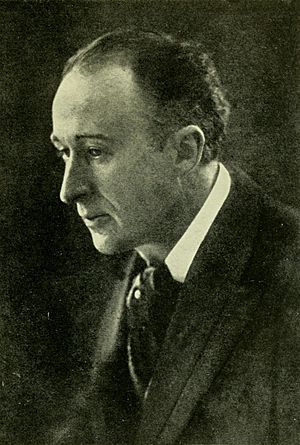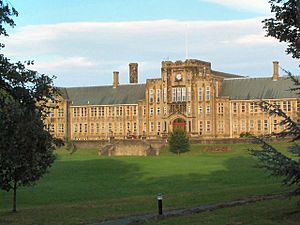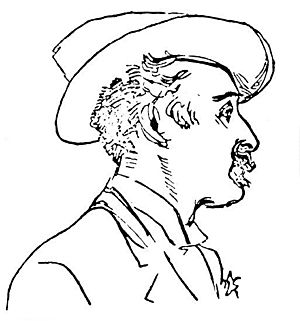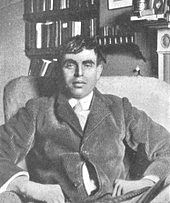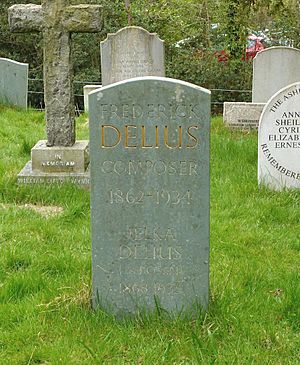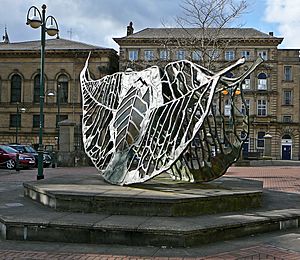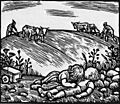Frederick Delius facts for kids
Frederick Theodore Albert Delius CH ( 29 January 1862 – 10 June 1934), originally Fritz Delius, was an English composer.
Contents
Life
Early years
Delius was born in Bradford in Yorkshire. He was the second of four sons (there were also ten daughters) born to Julius Delius (1822–1901) and his wife Elise Pauline, née Krönig (1838–1929).
The Delius household was musical; famous musicians such as Joseph Joachim and Carlo Alfredo Piatti were guests, and played for the family. Despite his German parentage, the young Fritz was drawn to the music of Chopin and Grieg rather than the Austro-German music of Mozart and Beethoven, a preference that endured all his life. The young Delius was first taught the violin by Rudolph Bauerkeller of the Hallé Orchestra, and had more advanced studies under George Haddock of Leeds.
Although Delius achieved enough skill as a violinist to set up as a violin teacher in later years, his chief musical joy was to improvise at the piano, and it was a piano piece, a waltz by Chopin, that gave him his first ecstatic encounter with music. From 1874 to 1878, Delius was educated at Bradford Grammar School. He then attended the International College at Isleworth (just west of London) between 1878 and 1880. As a pupil he was neither especially quick nor diligent, but the college was conveniently close to the city for Delius to be able to attend concerts and opera.
Julius Delius assumed that his son would play a part in the family wool business, and for the next three years he tried hard to persuade him to do so. Delius's first job was as the firm's representative in Stroud in Gloucestershire, where he did moderately well. After being sent in a similar capacity to Chemnitz, he neglected his duties in favour of trips to the major musical centres of Germany, and musical studies with Hans Sitt. His father sent him to Sweden, where he again put his artistic interests ahead of commerce, coming under the influence of the Norwegian dramatists Henrik Ibsen and Gunnar Heiberg. Delius was then sent to represent the firm in France, but he frequently absented himself from business for excursions to the French Riviera. After this, Julius Delius recognised that there was no prospect that his son would succeed in the family business, but he remained opposed to music as a profession, and instead sent him to Florida to manage an orange plantation.
While in Florida, Delius had his first composition published, a polka for piano called Zum Carnival. In late 1885 he left a caretaker in charge of Solano Grove and moved to Danville, Virginia. Thereafter he pursued a wholly musical career. An advertisement in the local paper announced, "Fritz Delius will begin at once giving instruction in Piano, Violin, Theory and Composition. He will give lessons at the residences of his pupils. Terms reasonable." Delius also offered lessons in French and German. Danville had a thriving musical life, and early works of his were publicly performed there.
Leipzig and Paris
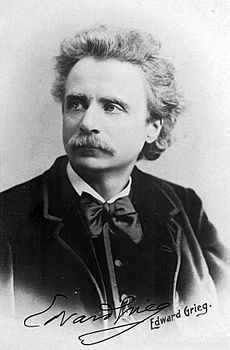
In 1886, Julius Delius finally agreed to allow his son to pursue a musical career, and paid for him to study music formally. Back in Europe he enrolled at the conservatoire in Leipzig, Germany.
After leaving Leipzig in 1888, Delius moved to Paris where his uncle, Theodore, took him under his wing and looked after him socially and financially. He mixed very little with French musicians. As a result, his music never became widely known in France.
Delius's Paris years were musically productive. His symphonic poem Paa Vidderne was performed in Christiania in 1891 and in Monte Carlo in 1894; Gunnar Heiberg commissioned Delius to provide incidental music for his play Folkeraadet in 1897; and Delius's second opera, The Magic Fountain, was accepted for staging at Prague, but the project fell through for unknown reasons. Other works of the period were the fantasy overture Over the Hills and Far Away (1895–97) and orchestral variations, Appalachia: Variations on an Old Slave Song (1896, rewritten in 1904 for voices and orchestra).
First successes
In 1897, Delius met the German artist Jelka Rosen, who later became his wife. She was a professional painter, a friend of Auguste Rodin, and a regular exhibitor at the Salon des Indépendants. Jelka quickly declared her admiration for the young composer's music, and the couple were drawn closer together by a shared passion for the works of the German philosopher Friedrich Nietzsche and the music of Grieg. Jelka bought a house in Grez-sur-Loing, a village 40 miles (64 km) outside Paris on the edge of Fontainebleau. Delius visited her there, and after a brief return visit to Florida, he moved in with her.
In 1903 they married, and, apart from a short period when the area was threatened by the advancing German army during the First World War, Delius lived in Grez for the rest of his life.
In the same year, Delius began a fruitful association with German supporters of his music, the conductors Hans Haym, Fritz Cassirer and Alfred Hertz at Elberfeld, and Julius Buths at Düsseldorf.
Most of Delius's premieres of this period were given by Haym and his fellow German conductors. In 1904 Cassirer premiered Koanga, and in the same year the Piano Concerto was given in Elberfeld, and Lebenstanz in Düsseldorf. Appalachia (choral orchestral variations on an old slave song, also inspired by Florida) followed there in 1905. Sea Drift (a cantata with words taken from a poem by Walt Whitman) was premiered at Essen in 1906, and the opera A Village Romeo and Juliet in Berlin in 1907. Delius's reputation in Germany remained high until the First World War; in 1910 his rhapsody Brigg Fair was performed by 36 different German orchestras.
Growing reputation
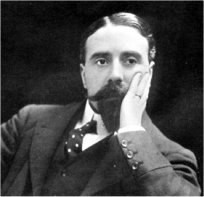
By 1907, thanks to performances of his works in many German cities, Delius was, as Thomas Beecham said, "floating safely on a wave of prosperity which increased as the year went on".
In the early years of the 20th century, Delius composed some of his most popular works, including Brigg Fair (1907), In a Summer Garden (1908, revised 1911), Summer Night on the River (1911), and On Hearing the First Cuckoo in Spring (1912).
War and post-war
During the First World War, Delius and Jelka moved from Grez to avoid the hostilities. They took up temporary residence in the south of England, where Delius continued to compose.
One of Delius's major wartime works was his Requiem, dedicated "to the memory of all young Artists fallen in the war".
By the end of the war, Delius and Jelka had returned to Grez. Delius's health was rapidly declining. He took treatment at clinics across Europe, but by 1922 he was walking with two sticks, and by 1928 he was paralysed and blind. There was no return to the prosperity of pre-war years: Delius's medical treatment was an additional expense, his blindness prevented him from composing, and his royalties were curtailed by the lack of continental performances of his music. Beecham gave discreet financial help, and the composer and musical benefactor H. Balfour Gardiner bought the house at Grez and allowed Delius and Jelka to live there rent-free.
Last years
A young English admirer, Eric Fenby, learning that Delius was trying to compose by dictating to Jelka, volunteered his services as an unpaid amanuensis. For five years, from 1928, he worked with Delius, taking down his new compositions from dictation, and helping him revise earlier works. Together they produced Cynara (a setting of words by Ernest Dowson), A Late Lark (a setting of W. E. Henley), A Song of Summer, a third violin sonata, the Irmelin prelude, and Idyll (1932), which reused music from Delius's short opera Margot la rouge, composed thirty years earlier. McVeagh rates their greatest joint production as The Songs of Farewell, settings of Whitman poems for chorus and orchestra, which were dedicated to Jelka. Other works produced in this period include a Caprice and Elegy for cello and orchestra written for the distinguished British cellist Beatrice Harrison, and a short orchestral piece, Fantastic Dance, which Delius dedicated to Fenby. The violin sonata incorporates the first, incomprehensible, melody that Delius had attempted to dictate to Fenby before their modus operandi had been worked out. Fenby's initial failure to pick up the tune led Delius to the view that "[the] boy is no good ... he cannot even take down a simple melody". Fenby later wrote a book about his experiences of working with Delius. Among other details, Fenby reveals Delius's love of cricket. The pair followed the 1930 Test series between England and Australia with great interest, and regaled a bemused Jelka with accounts of their boyhood exploits in the game. In 1932, Delius was awarded the Freedom of the City of Bradford.
Delius died at Grez on 10 June 1934, aged 72. He had wished to be buried in his own garden, but the French authorities forbade it. His alternative wish, despite his atheism, was to be buried "in some country churchyard in the south of England, where people could place wild flowers". At this time Jelka was too ill to make the journey across the Channel, and Delius was temporarily buried in the local cemetery at Grez.
By May 1935, Jelka felt she had enough strength to undertake the crossing to attend a reburial in England. She chose St Peter's church, Limpsfield, Surrey as the site for the grave. She sailed to England for the service, but became ill en route, and on arrival was taken to hospital in Dover and then Kensington in London, missing the reburial on 26 May. The ceremony took place at midnight; the headline in the Sunday Dispatch was "Sixty People Under Flickering Lamps In A Surrey Churchyard". The vicar offered a prayer: "May the souls of the departed through the mercy of God rest in peace." Jelka died two days later, on 28 May. She was buried in the same grave as Delius.
Memorials and legacy
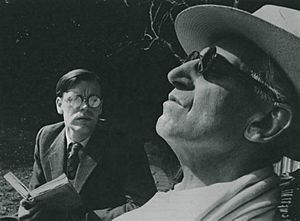
Just before his death, Delius prepared a codicil to his will whereby the royalties on future performances of his music would be used to support an annual concert of works by young composers. Delius died before this provision could be legally effected; Fenby says that Beecham then persuaded Jelka in her own will to abandon the concerts idea and apply the royalties towards the editing and recording of Delius's main works. After Jelka's death in 1935 the Delius Trust was established, to supervise this task. As stipulated in Jelka's will, the Trust operated largely under Beecham's direction. After Beecham's death in 1961 advisers were appointed to assist the trustees, and in 1979 the administration of the Trust was taken over by the Musicians' Benevolent Fund. Over the years the Trust's objectives have been extended so that it can promote the music of other composers who were Delius's contemporaries. The Trust is a co-sponsor of the Royal Philharmonic Society's Composition Prize for young composers.
Herbert Stothart made arrangements of Delius's music, particularly Appalachia, for the 1946 film The Yearling.
In America, a small memorial to Delius stands in Solano Grove. The Delius Association of Florida has for many years organised an annual festival at Jacksonville, to mark the composer's birthday. At Jacksonville University, the Music Faculty awards an annual Delius Composition Prize. In February 2012 Delius was one of ten prominent Britons honoured by the Royal Mail in the "Britons of Distinction" stamps set.
Images for kids
-
The Fisk Jubilee Singers, portrayed during a European tour in the 1870s
-
Woodcut illustration (1919) of the young lovers from Gottfried Keller's original story, which became Delius's opera A Village Romeo and Juliet
See also
 In Spanish: Frederick Delius para niños
In Spanish: Frederick Delius para niños


